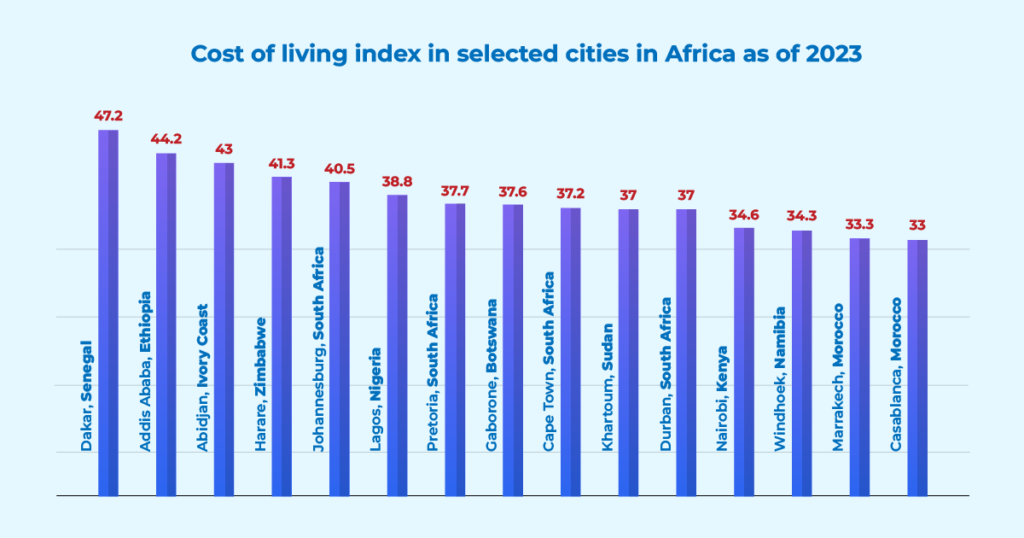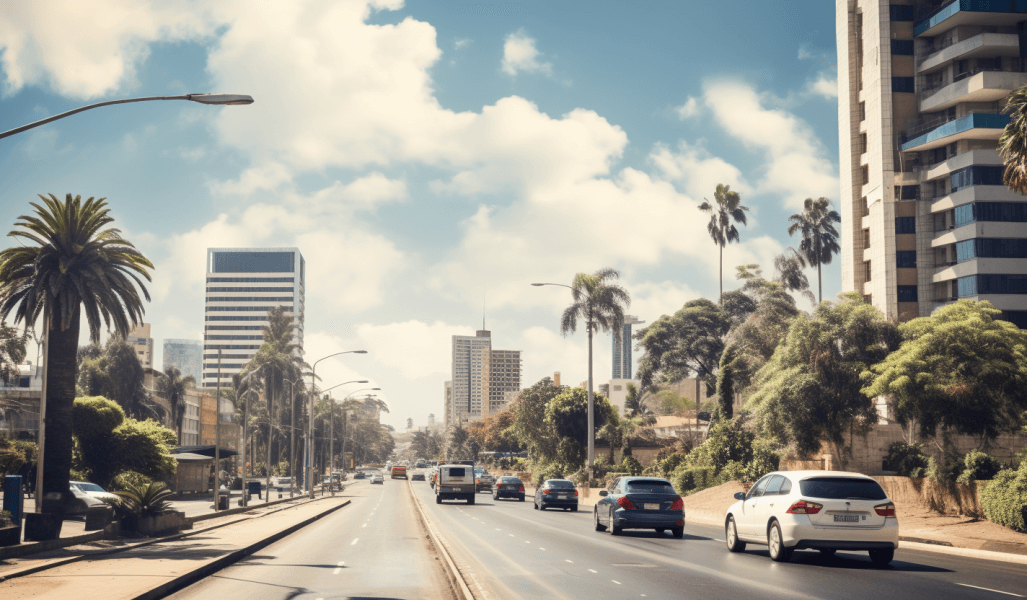Which city in Africa is the most expensive to live in right now?
Let’s take a closer look at the current list of the top 5 priciest cities in Africa and see how much it costs to live there.
In East Africa, Kampala in Uganda is the city with the highest cost of living and takes up the 15th spot in the continent.
READ ALSO: The 7 Biggest Malls in East Africa
Table of Contents
Cost-of-Living Index
Below, is a list of the most expensive cities in Africa.
This list is made based on the cost-of-living index. A cost-of-living index is a numerical measurement used to assess and compare the relative expense of living in different locations or regions. It is designed to provide an estimate of how much money is needed to maintain a certain standard of living, including basic necessities and discretionary spending.

This in turn helps us figure out how much money we need to maintain a certain way of life. This index also shows us how this cost has changed over time.
This cost of living includes all the important things we need, like housing, food, transportation, taking care of children, healthcare, and other basic stuff we can’t do without.
Most Expensive Cities in Africa
So, with all this in mind, here’s the latest ranking of Africa’s most expensive cities for this year, based on their cost of living scores.
1. Dakar, Senegal
Country: Senegal
Cost of living index: 47.2
Population: Approximately 3.4 million
Recent data highlights Dakar as Africa’s most expensive city with a cost of living index of 47.2. As the capital of Senegal, a French-speaking country in West Africa, Dakar boasts a metropolitan population of about 3.4 million. The city’s allure lies in its attractiveness to expatriates seeking business opportunities in trade and investments.
Dakar also features exquisite hotels, resorts, nightclubs, and various recreational centers, making it an enticing destination for tourists eager to experience the best the continent has to offer. Known as a hub of commerce and tourism, Dakar, with its coastal setting, plays a vital role in shipping for Senegal, as well as North and West Africa.
This strategic position, situated at the westernmost tip of Africa, provides easy accessibility for ships traveling to and from Western Europe.
2. Addis Ababa, Ethiopia
Country: Ethiopia
Cost of living index: 44.2
Population: Approximately 5.4 million
Positioned in the Horn of Africa and part of a nation with a population exceeding 110 million, Ethiopia’s overall cost of living index stands at 44.2.
Addis Ababa, the capital of Ethiopia, is not only one of Africa’s oldest cities, but it also holds historical significance as the seat of the old Ethiopian Empire. The city exudes opulence, and after exploring its rich history and admiring its iconic landmarks, the decision to visit becomes an easy one.
As one of Africa’s most popular destinations, Addis Ababa welcomes a diverse array of visitors from around the globe. The city boasts of various prestigious hotels, featuring renowned names in the hospitality industry.
Given the city’s prominence in tourism, there is a heightened demand for high-quality goods, contributing to a relatively higher cost of living. However, this also fuels job opportunities in the services sector, making Addis Ababa a thriving commercial hub with a robust economy.
Food prices in Ethiopia are relatively high due to factors such as inadequate infrastructure, and restricted access to markets. Housing is another noteworthy expense, driven by a high demand for urban housing that often surpasses available supply, resulting in elevated rent prices.
3. Abidjan, Ivory Coast
Country: Ivory Coast
Cost of living index: 43
Population: Approximately 5.6 million
Often hailed as the unofficial capital of French West Africa, Abidjan maintains strong ties with France, hosting numerous French businesses and entrepreneurs. The city’s port serves as the primary hub for raw materials leaving and finished goods arriving in French West Africa, even those destined for neighboring countries.
Ivory Coast is experiencing rapid economic growth in the western region of Africa, accompanied by a burgeoning middle class. It is positioned as the 19th most expensive country in Africa, with a cost of living index at 43 and a local purchasing power of 7.8.
Abidjan offers a vibrant leisure scene with pristine beaches, upscale hotels, exotic dining, and lively nightlife.
The city’s thriving real estate and hospitality sectors cater to a constant flow of commerce-driven individuals. Housing and hospitality come at a premium. Abidjan, with its rich cultural offerings and energetic nightlife, is a must-visit for French speakers.
4. Harare, Zimbabwe
Country: Zimbabwe
Cost of living: 41.3
Population: Approximately 1.5 million
Harare, the capital of Zimbabwe, is known for its high cost of living, driven by economic challenges. With a staggering 150% interest rate, it’s the world’s most expensive country to borrow money in. For half of 2022, the rate was even higher at 200%. Despite recent inflation downtrends, Zimbabwe faces economic hurdles, including currency instability.
The cost of living index is 41.3, with a local purchasing power of 18.7. In this environment, affording everyday necessities has become a struggle for many. The city, spanning 960.6 km², is a hub for commerce, tourism, and cultural events like the Harare International Festival of the Arts. It’s also home to numerous diplomatic embassies, affirming its importance in Southern Africa.
5. Johannesburg, South Africa
Country: South Africa
Cost of living index: 40.5
Population: Approximately 6.1 million
Despite being Africa’s wealthiest city, Johannesburg manages to offer a comparatively affordable cost of living. With a population of about 6.1 million, Johannesburg has a cost of living index of 40.5.
Originally built on a foundation of gold, the city has diversified into mining, finance, hospitality, entertainment, and services. Johannesburg is a trendy metropolis where you’ll find all the luxuries one could desire.
While it’s not the cheapest city, it’s more affordable than many on the continent. Johannesburg is a global gold hub and boasts fashion, finance, and winemaking. The city’s hotels are world-class, and its sandy beaches are popular for various activities. Whether you’re a big spender or on a budget, Johannesburg caters to a diverse range of residents and visitors.
To provide a comparison, you would need around Ksh 352,060 in Johannesburg to maintain the same standard of life that you can have with Ksh 280,000 in Nairobi.
The data is obtained from Statista.



